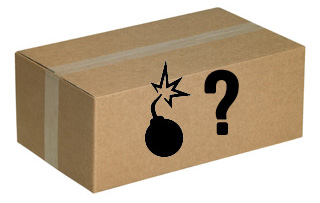 Yesterday, Washington Times reporter Amanda Carpenter posted a Twitpic of a weird package in a Metro tunnel with the following tweet:
Yesterday, Washington Times reporter Amanda Carpenter posted a Twitpic of a weird package in a Metro tunnel with the following tweet:"File this under sketchy things I see in metro tunnels. Packages that looks like bombs waiting to blow"
It's not that infrequent for Metro to have a "police situation" regarding a "suspicious package," so we thought we'd find out more.
According to Metro, in 2008, "Metro Transit Police received 337 calls for suspicious packages or substances. Of those calls, further action was required on 30 and only three caused rail delays."
Metro encourages the reporting of suspicious packages and offers the following list of criteria which could make a package worth reporting:
* unusual batteries or wires
* tanks, bottles or bags indicating the presence of a chemical
* a message attached to the article
* suspicious clouds, mists, gases, vapors or odors
* the appearance of something seeping from the article
* the observation of someone abandoning the article and quickly leaving
* finding the article in an out of the way place
2008's number are way down from 2005, when, in the aftermath of the transit attacks in London and Madrid, Metro received 165 reports of suspicious packages in July alone, according to an online chat with then GM Richard White.
White said "it is a delicate balancing act of maintaining a safe and secure system and at the same time, not creating endless service delays for every unattended item."
In 2006, Metro ran the infamous "Sumpnspicious" ad campaign urging riders to report unattended items. At least one rider was offended. (Search for Sumpnspicious here.)
Today, there are still frequent announcements in the system to be on the lookout for anything suspicious.
On the surface, it seems to makes sense to have riders be your first line of defense against potential bombs, but according to one security expert, it's a bad idea.
Security guru Bruce Schneier, writes in an essay that appeared on Wired.com "if you ask amateurs to act as front-line security personnel, you shouldn't be surprised when you get amateur security."
He told us that "in general, 'suspicious' packages are garbage, and should be treated as such."
He argues that by promoting the reporting of anything suspicious, you create an alarmist populace who will report even more "suspicious" things thus spreading professional enforcement/reaction resources too thinly.
The bottom line, according to Schneier: People will come forward when they see something truly odd, and they don't need to be encouraged to do so.





















 Oct. 11, 2012
Oct. 11, 2012 February 21, 2012
February 21, 2012 March 4, 2010
March 4, 2010





4 comments:
Additionally, it's clear that those that want to harm civilians often don't bother leaving such packages unattended.
Good point.
Is there any breakdown of what was actually in the purportedly suspicious packages? Were they things that made the list, like wires or tanks, or just some schmuck who decided to toss his empty McDonald's bag on the train rather than a trash can?
The rider who told the Metro Station Manager made a very good point, "I don't want to be bothered!"
I talked to a train operator who would report bags and was ignored by Central Control.
"'Every Man To Themselves' is the Motto you learn" at Metro, he said.
He said if the exit tunnel door locks there is no way to get back out.
In other words someone need to prop the door open?
"Metro Train Operators really have no emergency training other than a film we watched , 'Is that your bag"", he said.
Post a Comment